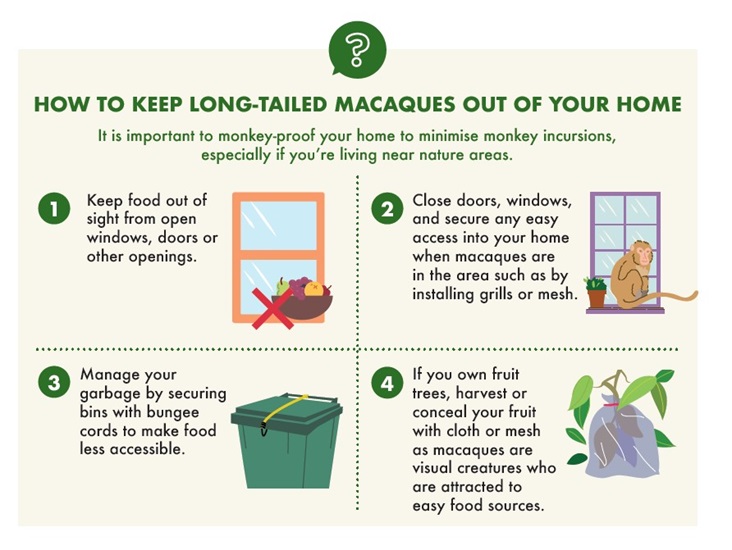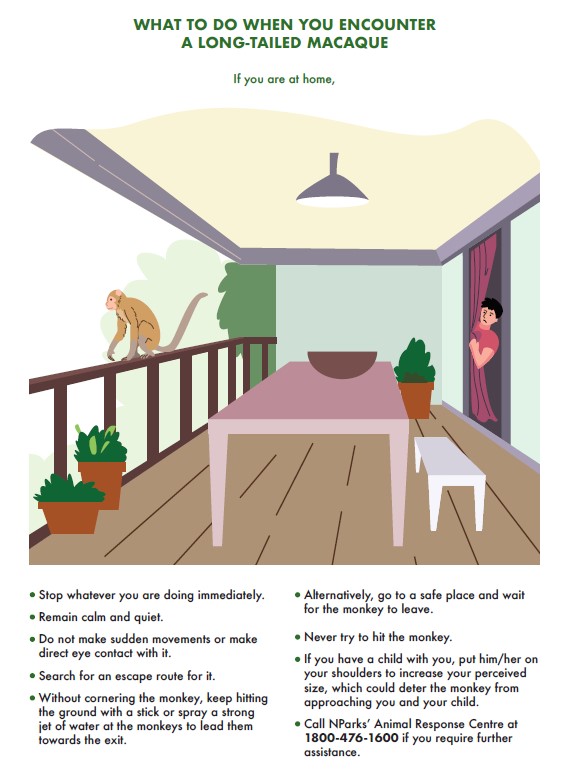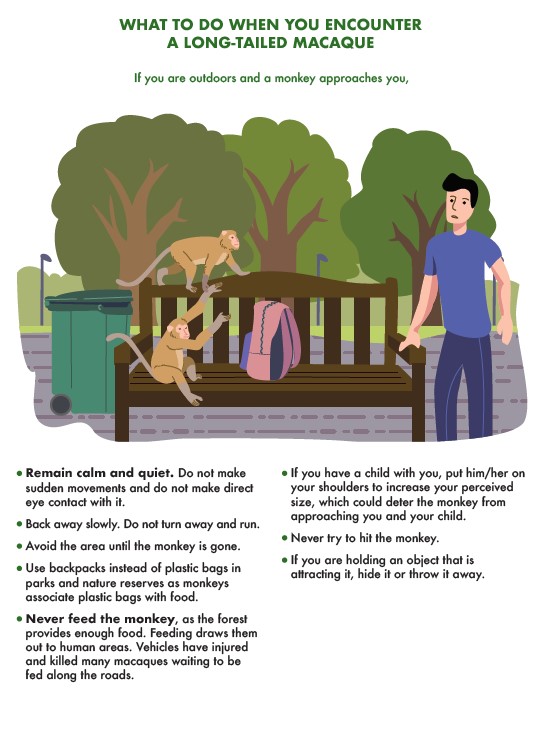Macaques
Keeping Monkeys at Bay

The Long-tailed Macaque (Macaca fascicularis) is one of our native primate species and a fundamental part of Singapore’s biodiversity. It naturally inhabits forested areas and can also be found in mangroves. However, being a forest fringe animal, it also frequents its immediate surroundings to explore and forage for food. Being innately curious, these monkeys may visit our homes to explore or to seek food.
When you encounter monkeys, please do not feed them. When the monkeys get used to being fed, they reduce their natural inclination to forage in the forest. This will incur long-term impacts as they also help in seed dispersal through the consumption of fruits naturally found in the forest and defecate as they move around the forest. Furthermore, with the nutrients contained in the excrement matter, the seeds will stand a higher chance of germinating and subsequent survival.
Having been conditioned to recognise plastic bags and other containers as food sources, they may instinctively grab these items when they see them. One way to help monkeys return to the forest is to minimise contact with them.
Read on for suggestions on how you can prevent monkeys from entering your home and what you can do when you encounter them or download the macaque advisory here.
How To Prevent Monkeys From Entering Your Home
1) Monkey-proof Your Home
- Install window mesh/grilles on windows and doors.
This allows for ventilation while preventing monkeys from gaining access to your premises.
- Close all windows and doors, including bathroom windows, when monkeys are spotted in the vicinity or when no one is at home.
Monkeys tend to stay in an area only for a short period of time if they are unable to find food. Also, most have a regular travelling pattern and timing. It will be helpful to note those timings and ensure that all access points are secured during those periods.
- Secure pet entrances to prevent access by monkeys.
Small pet entrances to allow cats and dogs to get in and out during the day can be used by monkeys to gain access into your home. Ensure such entrances are latched when not in use.
2) Keep Food Out of Sight
- Food can be stored in ovens/microwaves/cabinets, or covered in opaque containers.
Without visible food sources, your home is less attractive to monkeys.
- Keep prayer offerings within the house.
- Use recyclable cloth bags when walking home with groceries.
As monkeys recognise plastic grocery bags as food sources, they are likely to try to snatch the bags. Cloth bags and backpacks are less attractive to them.
3) Manage Your Refuse

- Double-knot your garbage bag and dispose it in bins. Secure the lid with an elastic strap or bungee cord as shown in the picture.
Secured trash bins make it less likely for monkeys to scour for food in your neighbourhood. Double-knotting your garbage bag will prevent spills and make food waste less accessible to monkeys.
- Keep your lawn and surrounding areas litter-free.
Monkeys are innately curious and drawn to litter, such as food containers and soda cans. By keeping your lawn and the area around your home free of litter, you can discourage the monkeys from coming in.
4) Harvest Your Fruits
- Harvest fruits regularly and/or cover them with an opaque material.
In the forest, fruit trees are natural sources of food for the monkeys. If you own a fruit tree, harvest the fruits regularly, or cover them with an opaque material (e.g. gunny sack) to keep them out of sight from the monkeys.



Living in harmony with nature can become a reality for residents in the neighbourhood. The community needs to play their role to help the monkeys return to the forest and regain their natural behaviour of foraging.
If you have further queries, please contact us through our online feedback form at https://www.avs.gov.sg/feedback.